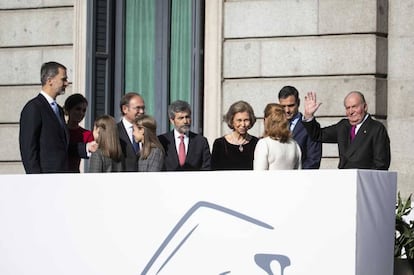Former Spanish King Juan Carlos I to retire from public life
The father of current monarch Felipe VI, who is aged 81, has informed his son via a letter that he will no longer be making official appearances

The former king of Spain, Juan Carlos I, has officially informed his son, King Felipe VI, of his plans to withdraw from official events and retire from public life from June 2, which will be the five-year anniversary of his abdication of the throne.
Although Juan Carlos played a minor role in the official agenda of La Zarzuela, the seat of the royal household, he was required to attend special cultural events and award ceremonies. The former king played a more active role last year in a series of initiatives and public events organized to celebrate the 40th anniversary of the Spanish Constitution as well as his 80th birthday.
In a letter that has been shared by La Zarzuela, Juan Carlos tells Felipe VI that five years after his abdication, he believes the moment has arrived to retire from public life and withdraw from the institutional activities he has been a part of. According to the missive, Juan Carlos has been considering his retirement since his 80th birthday on January 5, 2018. The celebration of the 40th anniversary of the Spanish Constitution in Congress, an event where he played an important role, confirmed his decision.
“[It was] a solemn act, full of emotion for me, that evoked, with pride and admiration, the memory of the many people who made the political Transition [to democracy] possible and renewed my feeling of permanent gratitude toward the Spanish people, the true architect and leading protagonist of that transcendental stage of our recent history,” the letter reads.
Juan Carlos was forced to abdicate on June 2, 2014 at the lowest point of his career, plagued by poor health and also facing a public backlash over a controversial hunting expedition in Botswana and an embezzlement scandal known as the Nóos case, which involved his daughter, the Infanta Cristina de Borbón y Grecia and her husband Iñaki Urdangarin.
But his 38 years on the throne encompassed more than the hunting photo that brought an end to his reign. Juan Carlos played a decisive role in the transition to democracy and his time as king coincides with a period when Spain enjoyed its greatest democratic and economic prosperity.
Following the scandals that led to his abdication, the royal household limited Juan Carlos’s activities in the official agenda to protect the monarchy from the potentially negative impact his presence could cause. After Princess Cristina was acquitted in the Nóos case on February 17, 2017, Juan Carlos began again to take a more active role in official acts.
Despite his failing physical condition and the fact he was no longer head of state, Juan Carlos I has always been available on the official agenda of the royal household, but with discretion and varying degrees of involvement. Since he abdicated the throne, Juan Carlos has attended 120 acts, given 30 speeches and gone on nine official trips, most for cultural purposes but also as a key political figure. In 2016 for example, Juan Carlos traveled to Colombia to witness the signing of the peace agreement between the Colombian government and the Revolutionary Armed Forces of Colombia (FARC). Since 2014, he has also attended the opening of the expanded Panama Canal, the funeral of Fidel Castro, and several Latin American presidential inaugurations.
At the opening of the photographic exhibition “40 Years of Spanish Democracy, a Story of Success” on November 28, 2018, King Felipe VI celebrated the role of his father as a “witness and direct participant [of the] profound and decisive transformation of Spain” after the return to democracy. Felipe VI repeated this praise a month later at an act in Spanish Congress to celebrate the 40th anniversary of the Spanish Constitution.
The announcement of Juan Carlos’s retirement comes as his public image has started to recover from the past scandals. But despite this, the former king has continued to be dragged into political controversy, with alleged recordings of discussions regarding his business affairs seeking to damage his reputation for political and legal gain.
Juan Carlos was last seen in public in the Las Ventas bullfighting ring in Madrid for celebrations for the San Isidro festivities in May. The former king will remain a member of the royal family despite his retirement from public life. Juan Carlos’s decision does not affect his wife, Queen Sofía, who will continue to appear at activities organized by the royal household.
English version by Melissa Kitson.
Tu suscripción se está usando en otro dispositivo
¿Quieres añadir otro usuario a tu suscripción?
Si continúas leyendo en este dispositivo, no se podrá leer en el otro.
FlechaTu suscripción se está usando en otro dispositivo y solo puedes acceder a EL PAÍS desde un dispositivo a la vez.
Si quieres compartir tu cuenta, cambia tu suscripción a la modalidad Premium, así podrás añadir otro usuario. Cada uno accederá con su propia cuenta de email, lo que os permitirá personalizar vuestra experiencia en EL PAÍS.
¿Tienes una suscripción de empresa? Accede aquí para contratar más cuentas.
En el caso de no saber quién está usando tu cuenta, te recomendamos cambiar tu contraseña aquí.
Si decides continuar compartiendo tu cuenta, este mensaje se mostrará en tu dispositivo y en el de la otra persona que está usando tu cuenta de forma indefinida, afectando a tu experiencia de lectura. Puedes consultar aquí los términos y condiciones de la suscripción digital.









































